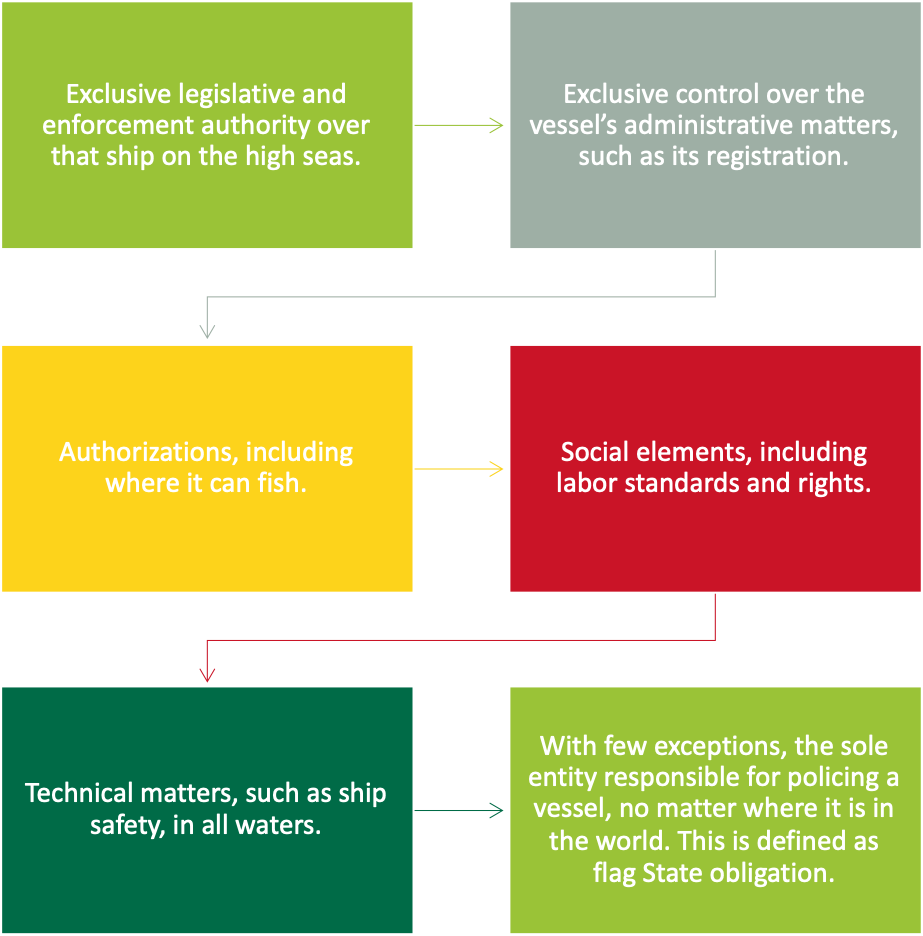How to Stop Illegal Fishing
Flag States
All fishing vessels operating internationally must be registered to a country, the flag State, and fly their flag. The ministry responsible for maritime affairs or transport will usually have the responsibility to register fishing vessels along with other commercial vessels. Countries may operate a national registry or an open registry or both and flag States enjoy almost exclusive jurisdiction over their vessels.
Flag States are responsible under international law to regulate and monitor the management and operations of their fishing vessels, including support and supply vessels for the fishing industry, to ensure their fleets are compliant. States that are members of regional fisheries management organisations (RFMO) are also obliged to ensure that their fishing vessels comply to their conservation and management measures (CMMs).
Illegal operators, target flags of non-compliance, also known as flags of convenience, attracted by their lax controls and ease of registration. But these flags undermine global efforts to develop sustainable fisheries, grow blue economies and stop illegal fishing.
Flag states play a critical role in controlling and monitoring the activity of their flagged vessels, and there is a significant opportunity for flag States to help stop illegal fishing.

Key recommendations:
- Ratify and implement relevant international instruments and agreements.
- Be aware that subsidies and overcapacity of fleets can have devastating effects on developing coastal States and ocean health.
- Build controls into flagging regulations and conditions, to include mandatory requirements for IMO numbers, AIS and VMS.
- Refuse to register vessels that have a history of non-compliance or of high-risk behaviour (flag-hopping and multiple name changes).
- Refuse to flag when there is an opaque ownership structure (shell companies or non-nationals).
- Refuse to flag vessels that have previously used known flags of non-compliance.
- Introduce systematic controls, including risk assessment, document verification and preregistration inspections for vessels and their owners, operators and agents.
- Provide effective oversight, through monitoring of positional data, inspections, observers, and at-sea patrols.
- Be transparent and provide public access to registration information through access to national records and sharing through the FAO Global Record of Vessels.
- Take action against non-compliance through sanctions, penalties, IUU listing and publicity.
- Cooperate systematically at the national, regional and international level.
- Respond quickly and fully to request from port and coastal States to support informed decision making on port access and licensing decisions.
How to Stop Illegal Fishing’ series
The ‘How to Stop Illegal Fishing’ series aims to improve awareness and understanding of the roles and responsibilities of different actors in stopping illegal fishing. As with all of SIF publications, it targets the needs of African fisheries and countries, is based on evidence and analysis, and places legality in the fisheries sector as an essential element of sustainable development.
Credits
Publishing of this pamphlet has been supported through a grant by The Waterloo Foundation to the work of Stop Illegal Fishing.